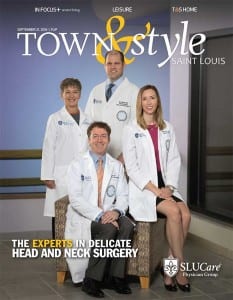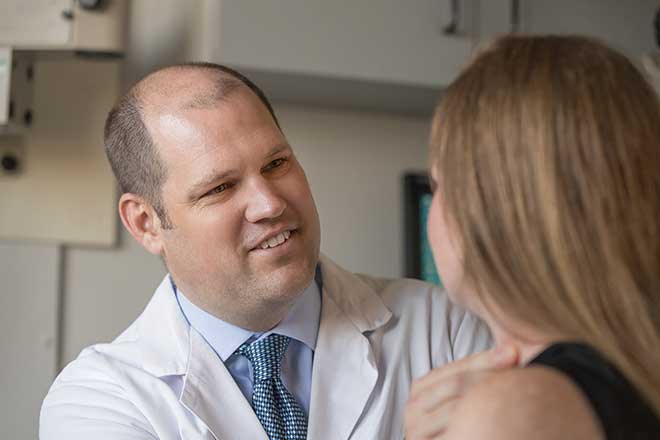“We are working in high-value real estate that impacts significant functions, including speaking, swallowing and breathing, as well as appearance,” says Dr. Gregory Ward about the type of delicate surgery he and colleague Dr. Ronald Walker routinely perform. The SLUCare otolaryngology surgeons operate at one of the region’s leading centers for head and neck surgery. In fact, the SLUCare center draws patients from across the Midwest for treatment of life-threatening cancers, tumors, endocrine disorders, trauma and other issues of the head and neck.
“All the tissues in the head and neck are vital,” says Walker, assistant professor of otolaryngology at Saint Louis University School of Medicine. “We’re trying to spare nerves and blood vessels; the higher we go in the neck, the more concentrated those become. There is a delicate balance between doing enough surgery to treat the disease appropriately and maintaining function.”
 No one knows better how important that delicate balance is than Diane Anderson, a videographer from Jackson, Missouri. When she noticed white spots forming on the gums of her right jaw four years ago, her dentist suggested she see a Cape Girardeau physician. He immediately referred her to SLUCare. “He told me there wasn’t anyone in Cape who could take care of me,” Anderson says. “He said Dr. Walker is the best when it comes to this.”
No one knows better how important that delicate balance is than Diane Anderson, a videographer from Jackson, Missouri. When she noticed white spots forming on the gums of her right jaw four years ago, her dentist suggested she see a Cape Girardeau physician. He immediately referred her to SLUCare. “He told me there wasn’t anyone in Cape who could take care of me,” Anderson says. “He said Dr. Walker is the best when it comes to this.”
Her diagnosis was squamous cell carcinoma. Removing the cancer required several inches of her jawbone to be replaced with bone taken from her leg. While head and neck cancers are not particularly common—about 5 percent of all cancers—“there are only a few doctors in the Midwest who take care of them,” Walker notes. “So I see patients from many places in eastern Missouri and central Illinois.”
Cancers of the tongue, voice box and esophagus are the most common among oral cancers, Walker says. Other issues treated at the center include removal of non-cancerous masses and enlarged glands, such as the thyroid and parathyroid. “We focus on a team-oriented approach,” he says. “Patients see everyone at once. Afterward, a speech therapist will see patients to help them with voice rehabilitation and swallowing, if needed.” Restoring both function and appearance are key components of head and neck surgery, points out Ward, also an assistant professor of otolaryngology at Saint Louis University. “We move tissues to hide the fact that we were there. It helps people pass the ‘mall test’—walking through the mall without being noticed.”
That has worked well for Anderson. “I feel great,” she says. “So many people have told me they wouldn’t have a clue anything had been done if they hadn’t already known me.” When she found out she had Stage IV cancer, “I was scared to death,” she says. “And when they told me about the surgery, that was even scarier. Somehow I knew everything was going to be OK. I knew God was taking care of it and had put Dr. Walker here for me.”
Pictured: Dr. Ronald Walker
Photo courtesy of SLUCare Physician Group
Dr. Ronald Walker and Dr. Gregory Ward, SLUCare otolaryngology surgeons, provide individualized, multidisciplinary and team-oriented care for diseases and conditions of the head and neck at offices in the St. Louis area and in Washington and Perryville, Missouri. For more information, call 314.977.4440 or visit slucare.edu/ent.
Cover design by Allie Bronsky | Cover photo courtesy of SLUCare Physician Group








